Ford's Evos may only be a concept car but with its four scissor doors reaching skyward to the heavens, it is both the most distinctive and important concept from Ford in many a year. The Evos is the first manifestation of the Blue Oval's "first truly global design language," a visual signature that Ford hopes will make its next generation of vehicles more recognizable than the current fleet. The plug-in hybrid will debut at the Frankfurt Motor Show two weeks from now and previews not just the new family resemblance, but the intuitive "cloud connected" functionality Ford will infuse into the next generation of vehicles.
When automotive designers discuss their company's "design language," they don't mean that all their products will look the same. A design language needs to be flexible enough for different sizes and types of vehicles, so that customers around the world will be able to immediately recognize the company's product.
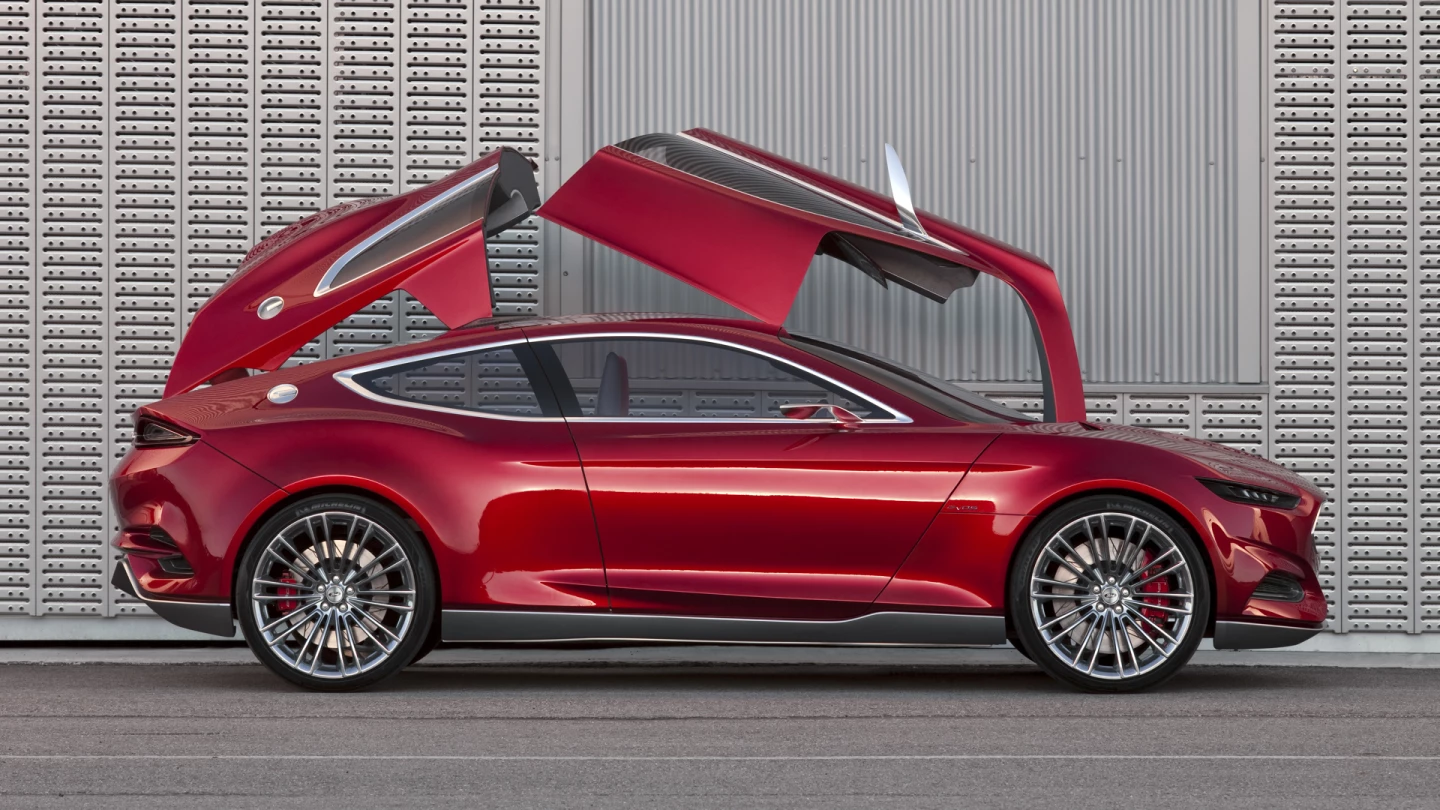
Whereas you can always instantly identify a BMW or Mercedes, regardless of the size or genre of the vehicle, Ford lost its recognition factor some time ago and a consistent design language has been on the agenda for some time. The front grill area is the focal point of any automotive design language and it's no coincidence that human family recognition also focuses on the visage or facial structure - you can be the judge of whether the new "face of Ford" trapezoidal grille is ugly or not, and most likely the new "design language" has already been tested before hundreds of focus groups across the world, as it's terribly important to have a handsome family in the automotive industry.
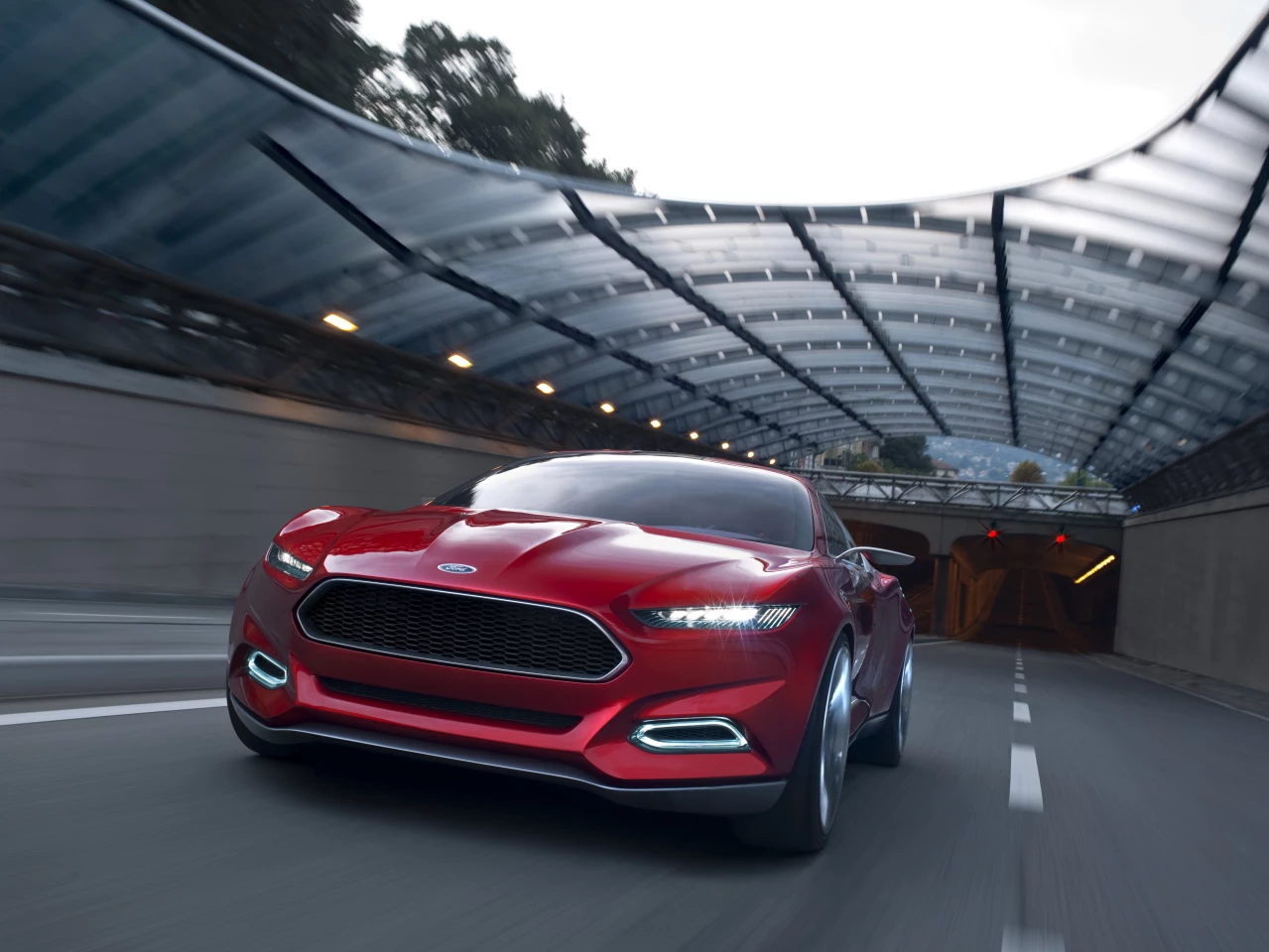
The Evos is the first vehicle we've seen to employ Ford's visual vocabulary and in my mind, it is a great looking car. The four gullwing doors will, or would undoubtedly draw a crowd if it were ever built - but Ford has already stated it will "never be built" so the gullwing doors might only ever be part of this concept, and not the future range. As far as aesthetics go, the team looks to have done a wonderful job.
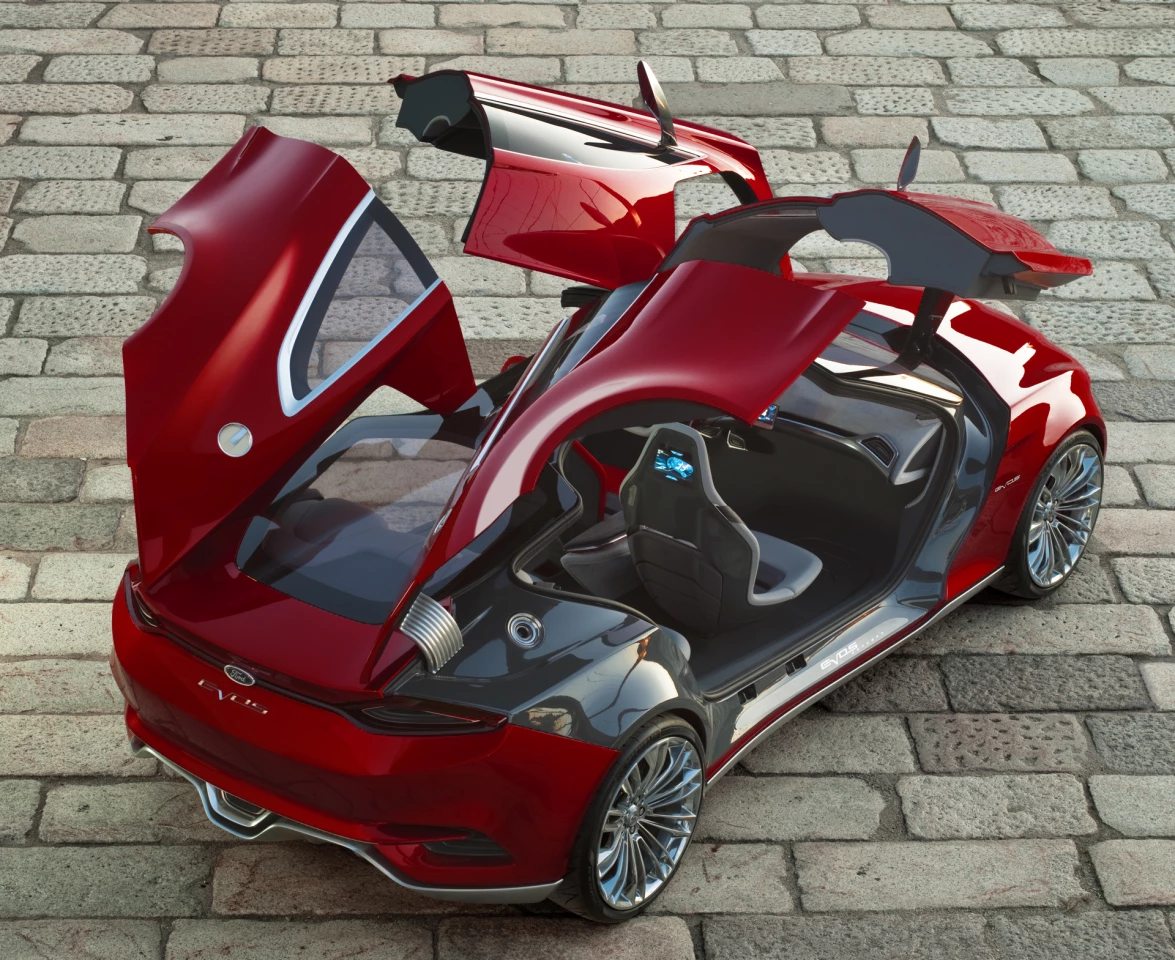
Buzzwords and "new technology"
We'd all like someone with an intimate understanding of our needs, and a constant desire to fulfill them, but when I see commercial companies promising anything from the upper layers of Mazlov's hierarchy, it's part of my job description to get cynical. Hence when I saw Ford's promise that it is intending to employ the "cloud" in its new vision for "customer-focused and intuitive technologies," I wanted to take a closer look. The "cloud" has risen fast as a marketing buzzword in recent times, threatening to displace "green", "intelligent", "market leading", "popular" (with no stats to back it up), "attractive", "innovative" and "revolutionary" from the top rungs of the PR copywriter lexicon.My big fear, is that when computers attempt to do this, they usually get it wrong, and if predictive text can get my limited vocabulary so wrong, and language translation can take perfectly discernible meaning and turn it into jibberish, what hope does a car manufacturer have of gaining a detailed understanding of my preferences and habits, combining them with "additional data drawn from the cloud" (AKA look things up on the internet), and providing me with a better driving experience.
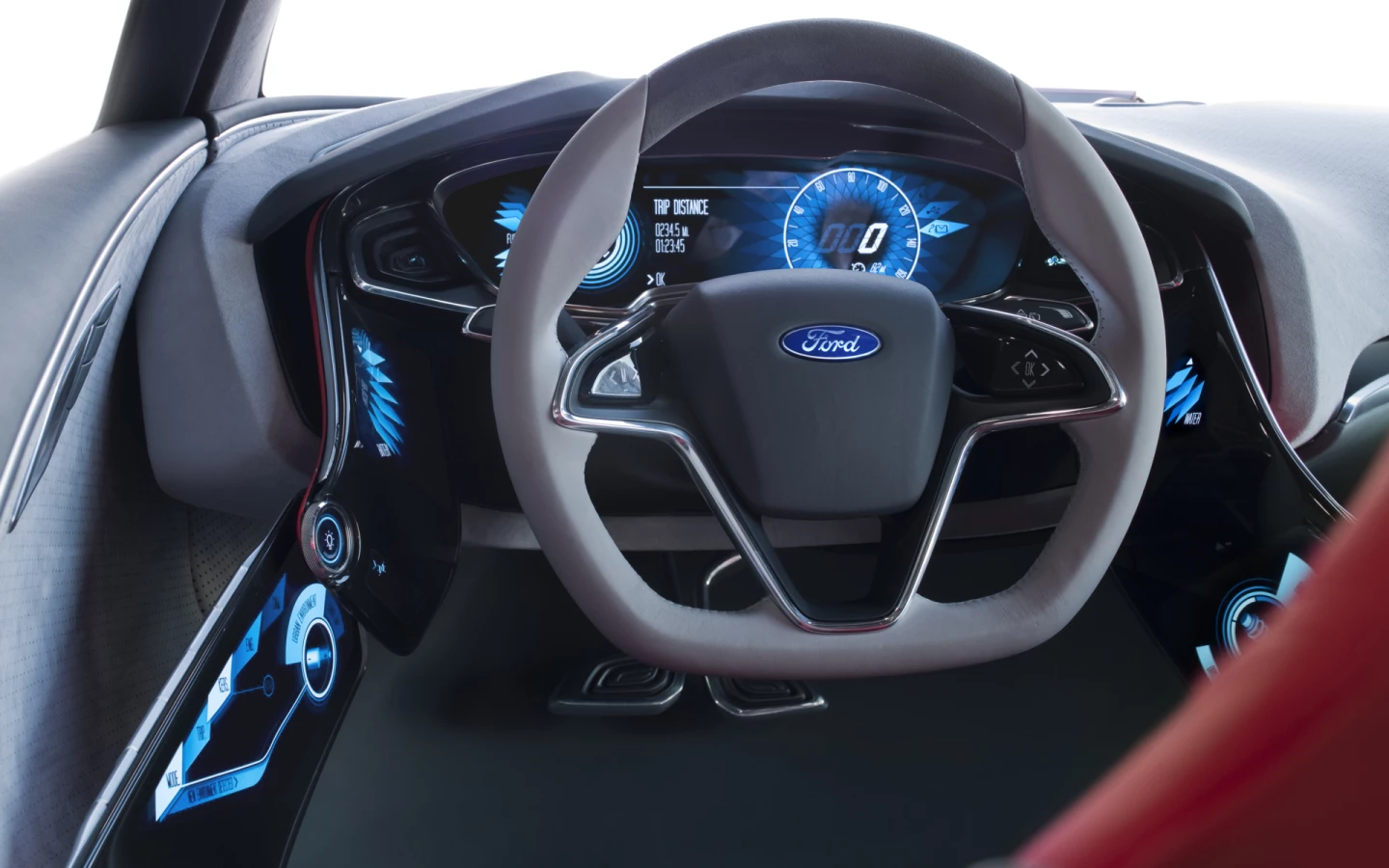
John Cleese's cult classic Fawlty Towers is the perfect example of what happens when a well meaning but communication-challenged and persistent servant (Manuel, or in this case, the automotive personal assistant) continually gets it wrong - you spend more time correcting things than getting on with life.
There's also a vagueness about Ford's communications that is beginning to worry me. Ford claims its advanced PHEV technology gives the Evos a driving range of more than 500 miles (800 kilometres) which it rightfully points out, is more than any other plug-in or extended-range electric vehicle. Does it breach the rules of fair play to be making such claims when you haven't announced the size of the battery or the motor? I think it does!
Ford says the plug-in hybrid (PHEV) powertrain in the Evos comes from the Ford C-MAX Energi scheduled for release next year, but details of that powertain are equally as scarce. We have been told the C-Max Energi can drive in all electric mode at 47 mph - everything else, such as the all-electric range, top speed, and battery size have yet to be announced. Ditto for any details on the internal combustion engine. I am prepared to suspend disbelief for films and storytellers, but not press releases.
We do know that Ford's "powersplit" hybrid architecture allows the electric motor and petrol engine to work together or separately, and that it typically runs in all-electric mode but there's a secrecy around the powertrain that tends to undermine the claims that it's the most advanced on the planet. Every other top 20 automotive manufacturer in the world is working on advanced hybrid technologies it has not yet disclosed. Ford is the fifth largest such manufacturer in the world, so the lack of detail is hardly confidence-inspiring regarding the veracity of the claims for a concept car's usable range, as it will never be tested.
Where the Evos raises most doubts though, is in the integration and usefulness of "cloud technology."
"We're researching how we can use patterns or preferences set by the driver to make life simpler," is how Paul Mascarenas, chief technical officer and vice president of Ford Research and Innovation, explained the advanced "cloud" technologies. "The car gets to know you and can act as a personal assistant to handle some of the usual routines of a daily commute."
Ford's intention to bring "smart technologies" to the next generation of its cars may give the company a whole new range of headaches, as it clearly expects the car to play a kind of personal assistant role, and that role, in my mind, is already clearly going to be taken by the smartphone. More than a few people I know have already discarded new smartphones because they prefer the way the old smartphone integrated with their way of doing things. That's a bummer if you've paid US$500, but it'd be significantly more of an inconvenience if you'd just outlaid US$50,000 for a car which didn't integrate with your life the way you wanted it to, or perhaps made decisions you didn't want it to make.
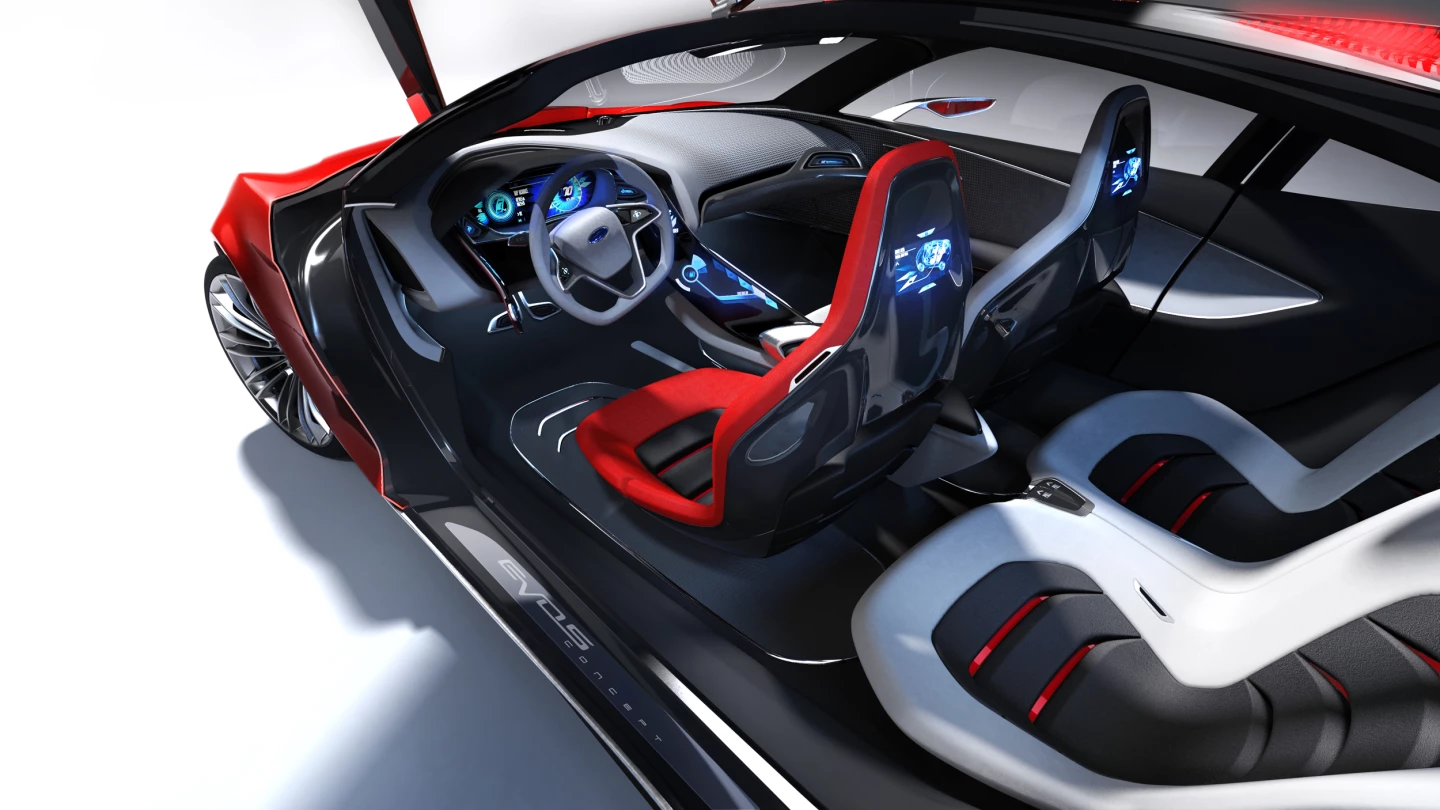
"We see technology as more than just an impressive list of microprocessors, sensors and software; it's about the application of that technology to create an experience that enhances the driver's time behind the wheel," was how the vision was described by Mascarenas.
The company claims four key focuses for the raft of new technologies - "personalisation, seamless enhancement of the driving experience, looking after the driver's well-being and delivering smart electrified powertrain optimization."
Combining a knowledge of the driver's preferences and driving habits, with additional data from the cloud, such as the driver's work schedule and local traffic or weather conditions is hardly likely to offer much of an advantage because most of those things need to be known before you get in the car, so you can dress appropriately and leave in enough time to get to where you need to be.
Going further on Ford's stated intentions, it offered examples of such usefulness as automatically playing "the same music or news program that was just streaming at home" - I, and probably every other car driver in the universe, use a screen (vision and sound) at home, and audio only in the car. It's a different environment to start with, and what I play resides on my smartphone when I leave the house. Research released last week suggests that most of the world's inhabitants will have smartphones by the end of the decade. It will undoubtedly be the device which rules our lives, not the car.
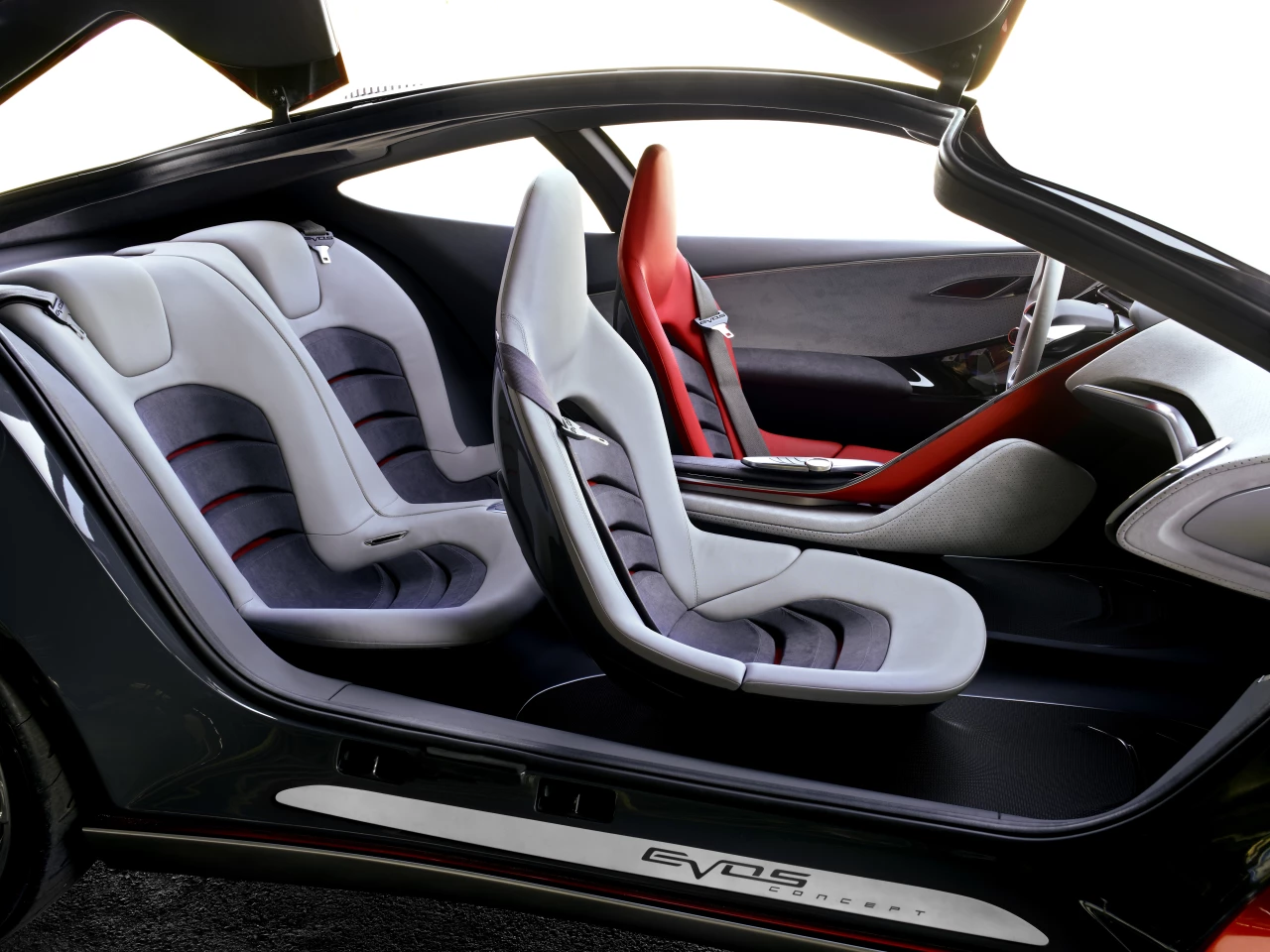
Yet another example of the system's benefits proffered by Ford was the ability to "heat or cool the interior to an ideal temperature before the driver gets in without having to be requested by predicting departure time based on his calendar." If Ford is aiming its future offerings only at office-based people who spend their day in meetings, with very fixed routines, that might be good, but trends suggest there are a lot more people who now work far more flexibly, or from home, or wherever they might be. Modern cars don't take more than a minute to achieve the desired temperature anyway, and having a car sitting in the garage maintaining the desired temperature while you take an impromptu 15 minute phone call over a coffee at home seems like an easy way to waste energy to me. Having a dumb car make decisions for a smart me will not fly, particularly if I have to stop it from doing what it thinks I want so I can actually get what I do want.
Yet another example offered by Ford was that the car would wirelessly communicate "with devices in the home" and could perform tasks such as "close the garage door and switch off the lights automatically as it pulls away." Call me old fashioned, but I like to know that the door is locked and the lights are off before I head off into the sunset. Such remote functionality might be useful if you get halfway to work and remember you had left the iron on, but I'm expecting an app in my smartphone to handle such "senior citizen moments," not my car.
I'm also doubtful my insurance company would be understanding about the car getting it wrong, forgetting to reset the security system, or any one of many potential risks. It's not all that long ago that most of the world's computer users regularly saw Microsoft's blue screen of death and I am still a little gun-shy about entrusting a computer to lock up after me without direct supervision.
"This cloud-connected vision shows the enormous potential of tailoring the driving experience to suit the exact personal tastes and moods of the driver," said Mascarenas. "From recommending a great driving road from friends on your social networks or resetting your alarm clock to let you sleep in when a morning meeting gets cancelled!"
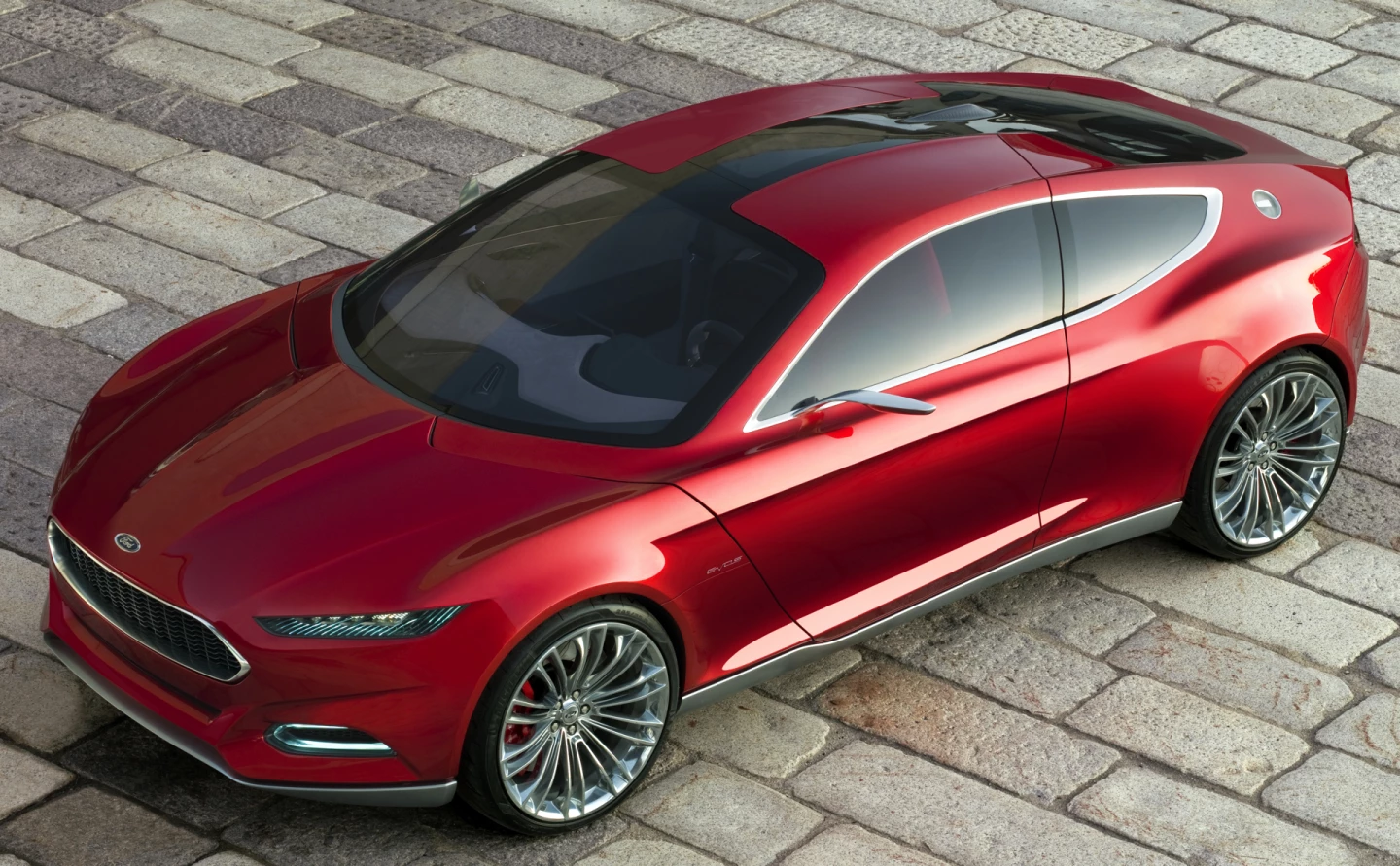
My computer/smartphone already assists me with intelligent choices, and I already know where to ask without getting a chorus opinions I do not respect to discern my way through. It's looking to me like Ford is going to attempt to make itself more relevant by replicating a whole host of services I already have. As for letting a car switch off my alarm clock if my first meeting is cancelled while I'm asleep ... might I suggest Ford checks the water cooler for hallucinogenic substances!
"Our goal is to focus on enriching a customer's every experience with their vehicle - by personalizing it, adapting it, and creating unique, unexpected features that surprise and delight them," said Derrick Kuzak, group vice president of Global Product Development. "In the Ford Evos Concept, this objective is explored and extended to the area of connectivity, where the intent is not to convert the vehicle into a smartphone, but rather to provide personalised and safe connection to the outside world in an enriching manner designed totally for the vehicle context."
More from the press kit: "The concept's technology experience embraces a new generation of driver interaction and awareness currently under development in the Ford Research and Innovation laboratories. Seamless connectivity between the vehicle and the driver's 'personal cloud' of information is at the heart of the vision for its capabilities."
"The possibilities are fascinating when we explore how to enable a seamless lifestyle between home, office and car linked by access to the driver's personal information," Mascarenas said.
I do get the idea, but I can't think of anything the computerized automobile will do for me that I don't want to do myself.
Am I missing something? Is that all they got? Sadly, it's not!
"With information from the cloud, the vehicle can provide the same connected lifestyle the driver experiences at home or office. The car knows the driver, and automatically adapts handling, steering and engine controls to deliver an exceptionally dynamic driving experience. Learning driver habits and capabilities, the technology can overlay map and weather data sourced from the cloud to adjust powertrain, steering, suspension and braking systems for optimum enjoyment, comfort and safety. Because the vehicle is adaptive and honed to maximum performance based on the situation, it takes driving engagement to a new level."
Right, so I am to understand that the car is going to make changes to the way it handles, brakes, steers and delivers its power, while I'm driving it. That does not sound helpful, or useful, or indeed, safe.
More from the press release: "Current technology requires vehicle chassis settings to be defined based upon the abilities and tastes of a cross-section of drivers and the topography of typical roads. The concept foresees tuning handling and performance to the road ahead and the specific individual behind the wheel."
I know someone who once witnessed a motorcycle test rider for a major manufacturer get the front damping changed by remote telemetry on a motorcycle he was riding in a closed testing session at the racetrack. The rider blamed the resultant 200 km/h tankslapper on the changes and upon returning to the pits he actually threw his helmet at the technician turning the dials.
If a highly experienced technician can get it wrong on a well known corner that they'd been over thousands of times before, what chance has a car got of making useful changes to how it behaves based on a report from the weather bureau and Google maps - this is sounding more astoundingly stupid with every paragraph.
Still more from the press statement: "Cloud connectivity would provide further opportunities to enhance performance and efficiency by selecting the optimum combination of powertrain modes for any given journey."
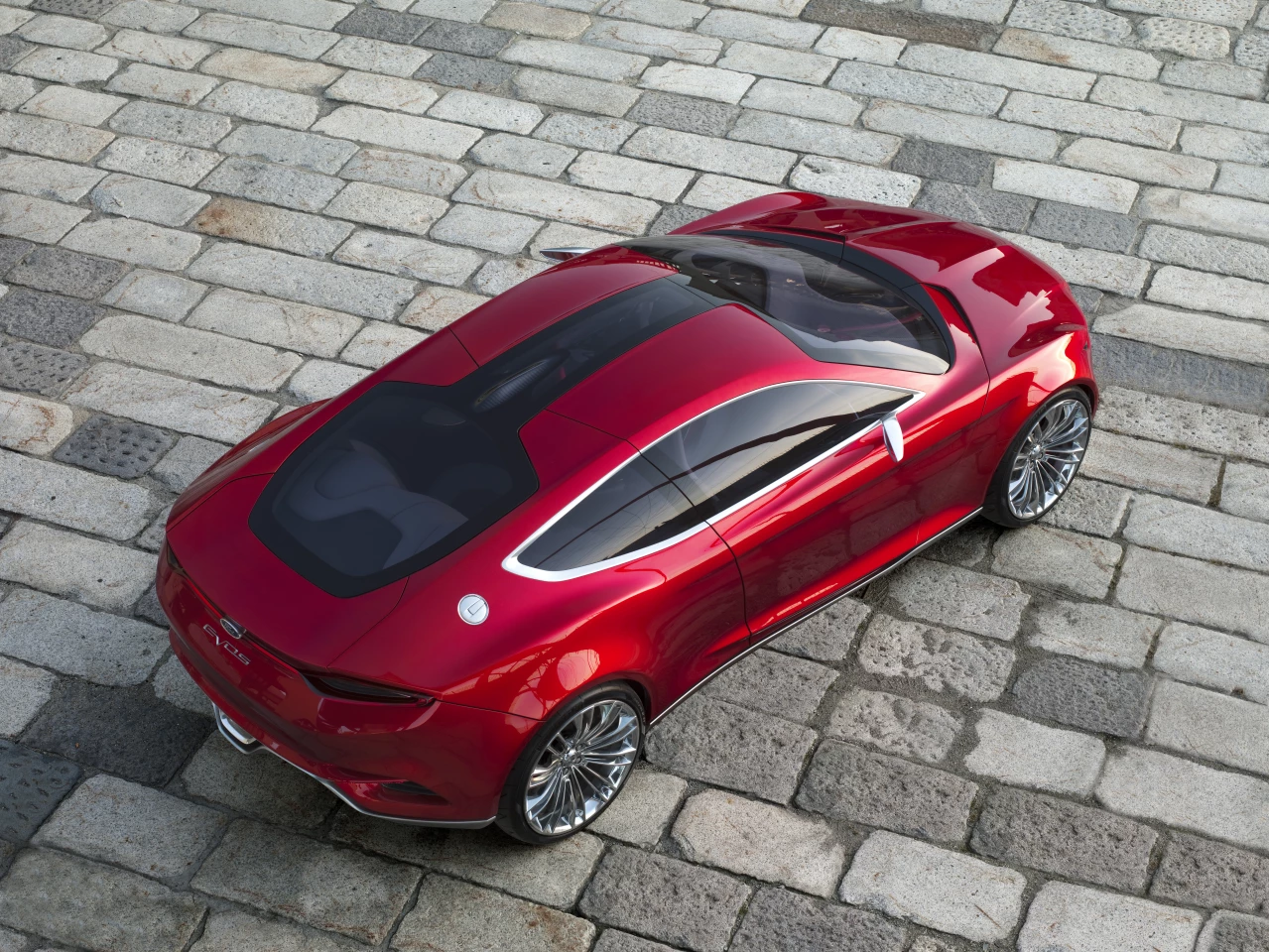
"Access to historical driver behavior and travel patterns allows us to calculate the optimal fuel and energy efficiency by predicting the destination," said Mascarenas. "Our researchers are working to increase understanding of driver behaviour, develop accurate protocols to predict it and enhance the trip by providing the smartest use of fuel or battery for the situation."
"The cloud-optimized powertrain would automatically 'know' when to save energy and switch modes, using information about the vehicle's predicted travel route, any emission zone restrictions during the journey and current weather conditions."
Okay, so now they're claiming the car will predict your travel route - surely if you know the route, you'll know about emission zone restrictions, and if you don't, the GPS will tell you about them. I have a four year old GPS that travels with me to different countries, and it can already notify of such zones, and reroute me past traffic congestion. The whole set of Ford's cloud-enhanced driving claims are beginning to sound like a set of solutions looking for problems.
More from the release: "Ford researchers have already developed technologies focused on driver wellness, such as the heart-rate monitoring seat and certified allergy-free interiors. With a seamless connection to the cloud, the Ford Evos Concept monitors the physical state and workload of the driver and adjusts the driving experience accordingly."
If you're at a loss to understand the connection between the cloud and the promised functionality, such as the heart-monitoring and allergy-free interiors, that's because Ford intends to access air quality data from the cloud and proactively suggest a healthier route to the destination.
As far as the heart monitoring goes, Ford's release explains, "in dynamic driving situations, the vehicle may simplify the appearance of the instrument panel to display only necessary gauge information and switch the driver's connected smartphone to "Do Not Disturb" mode to help keep the focus of attention on the road."
"Our wellness research and technologies are focused on relieving driver stress and enhancing their situational awareness," said Mascarenas. "Drivers around the world are spending more time behind the wheel, and the car should not be another stress point in their lives."
Now I'm not sure about you, but being interrupted to tell me to calm down or to consider another route where the air is cleaner is more likely to contribute to my stress than alleviate it. Switching my phone off because I don't know what's good for me even moreso. Not one of the decisions the Evos and the next generation of Ford cars will be making for the driver are decisions I wish to have them make.
Indeed, just as I was finishing this article, I got a new selection of information sent through by Gizmag's team at the IFA consumer electronics expo in Germany, and by the time I'd finished reading about Ford's new MyKey system, I was wondering if Ford's view of the marketplace isn't so "old school" that it is fatally flawed.
The MyKey system is designed to configure their Ford to limit how loud the stereo can be used, how fast the car can go, and to sound an array of warnings at different speed levels, all of which it believes will give parents peace of mind when they hand the keys over to their kids.
Good parenting involves helping your children make good decisions, not making them for them. Trust is part of that process. Children are making up their own mind far earlier than we did, and with Ford focusing on the parents point of view, it's clear where the marketing push for customers is focused. If Ford thinks such functionality will endear its vehicles to the younger generation starting out on the roads, it is mistaken. Acting like a misguided PTA will not win Ford young (AKA potential long term customers) friends.
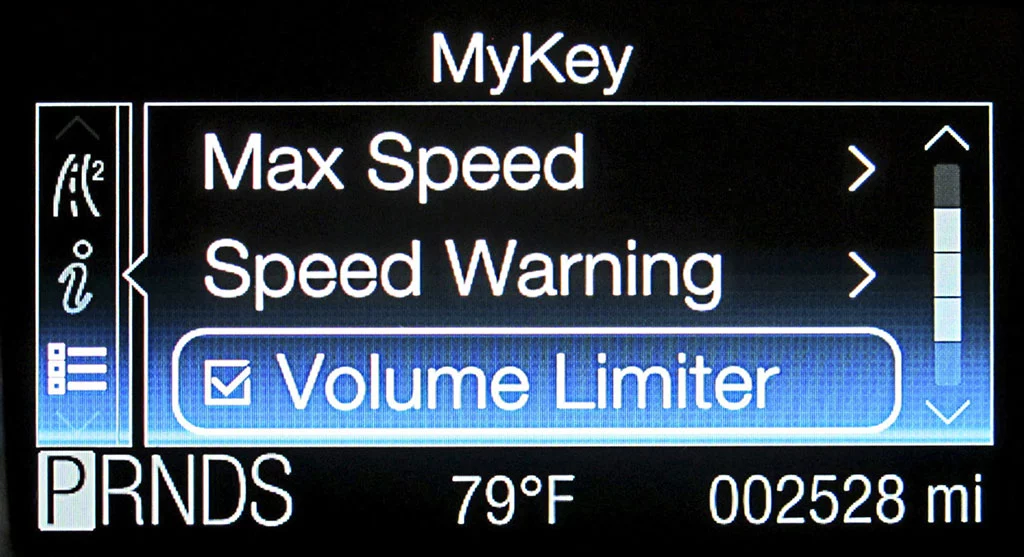
It looks a lot to me like Ford is looking for a way to make advanced technologies seem relevant to someone, and that anyone will do. There is undoubted promise in predictive technologies that make intelligent decisions when you're not capable of making better ones, but that time is not yet here.
Of course, you might like the idea of having Manuel from Fawlty Towers sitting in your back seat, turning off your mobile phone, and changing the configuration and feel of the powertrain, brakes, handling and suspension.
Like the geeky kid, Ford is acting smart in school, but dumb on the bus, and its popularity will suffer accordingly.



























































